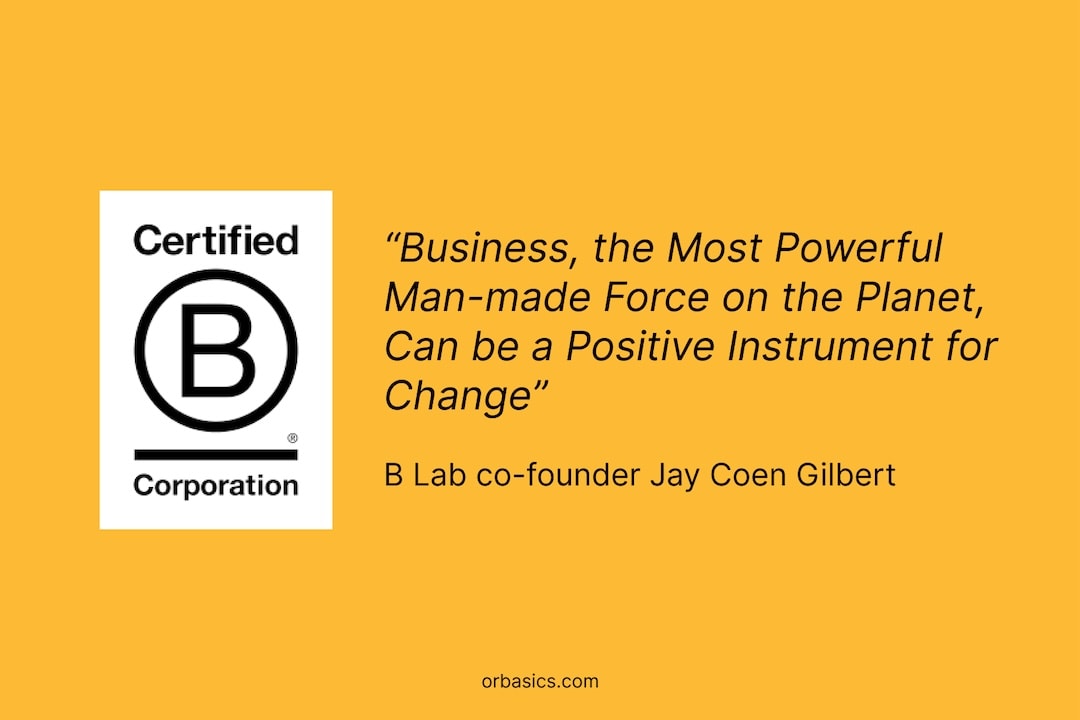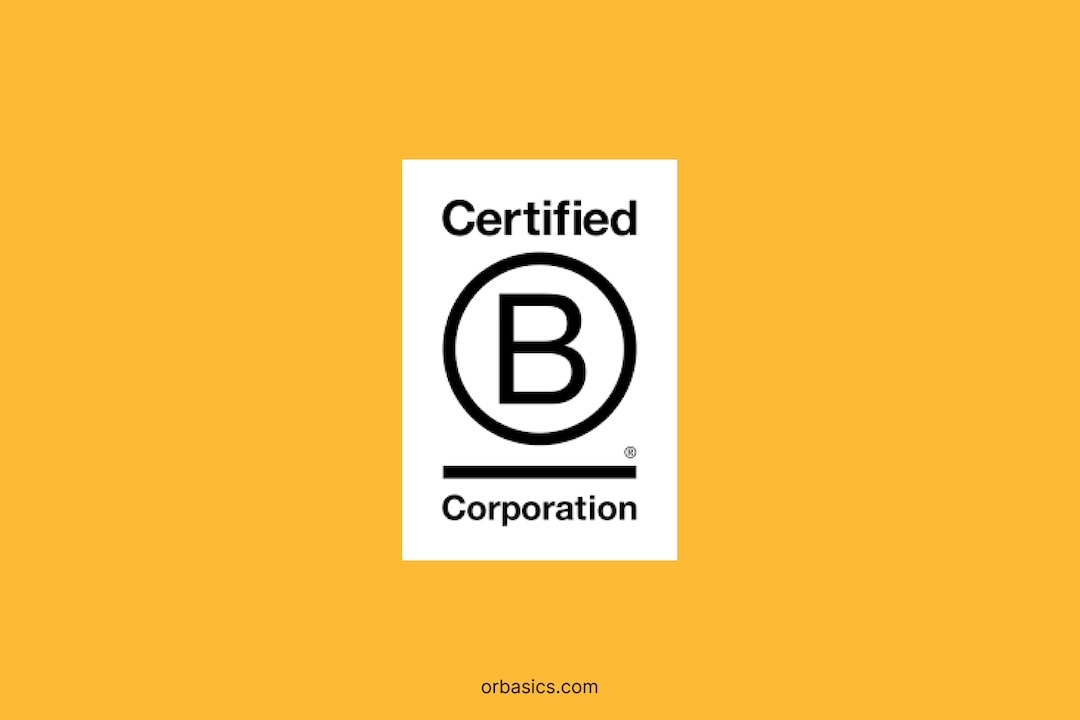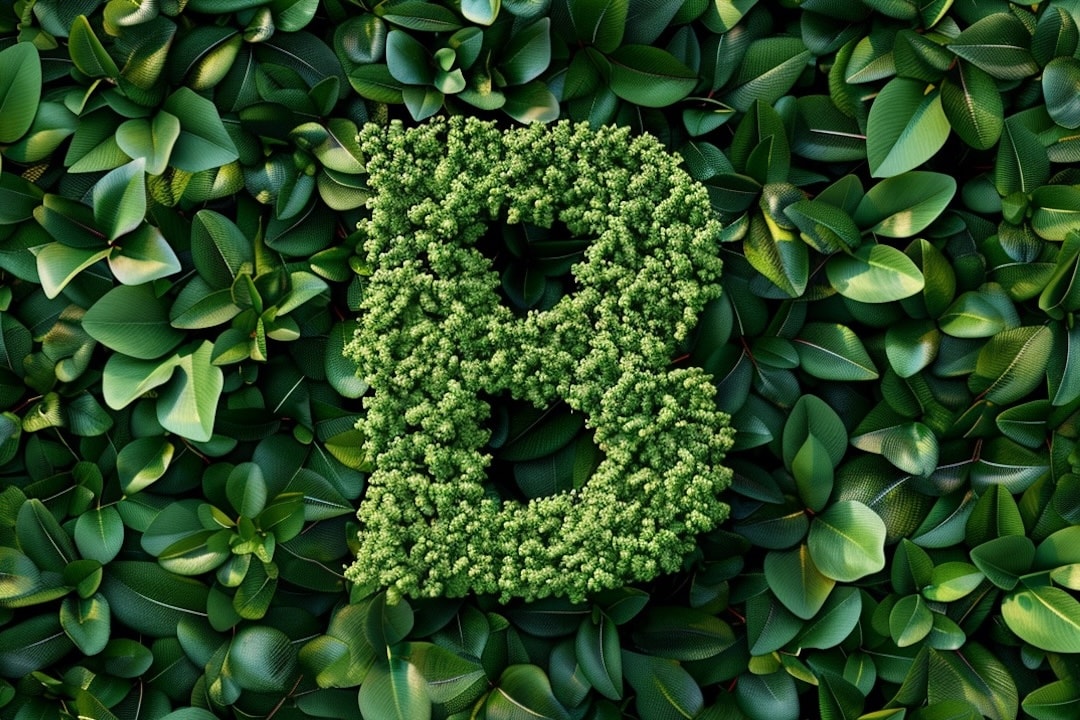Table of Contents
What is a Certified B Corporation, Anyway? Complete Guide (2026)
This page may contain affiliate links. We may earn a commission on purchases, at no additional cost to you. Learn more →
If you're passionate about sustainability, you've probably encountered a few sustainable brands with the classic "B Corp" logo on their products or website. But what is "Certified B Corporation" exactly?
One of the things I noticed when I started learning about sustainability is that third-party certifications are the best way to back up a company's claims. And the B Corp certification is the gold standard for sustainable businesses—or at least that's what we've been told.
We usually associate certified B Corporations with companies that prioritize sustainable business practices and workers' wellbeing while making a positive impact on the environment and communities.
Yet, the rule of thumb in sustainable living is to always look at things with a critical eye, even when it comes to the B Corp movement. Let's explore what certified B Corporations are, their certification process, how these ethical companies differ from traditional businesses, any controversies surrounding them, and which Certified B Corporations are worth supporting.

What is a B Corp certified company?
According to B Lab—the nonprofit organization that certifies B Corps, a B Corporation balances profit and purpose. Wondering how these sustainable companies achieve this balance? Let's find out.
B Corps are for-profit businesses that meet high standards for social and environmental performance, public transparency, and accountability. Unlike traditional, unethical corporations that prioritize profits above all else, B Corporations focus on more than just profitability, tackling often-overlooked social and environmental issues to make a positive impact on people, communities, and the planet.
This should be the norm, don’t you think? But since it’s not yet the case, the B Corp certification aims to help us distinguish between exploitative businesses and ethical companies. Let’s take a closer look at the key characteristics that set certified B corporations apart from the traditional business model.
Key Characteristics of Certified B Corporations
When I'm comparing different products, the one with the B Corp logo always catches my attention. And that's because choosing B Corps gives me peace of mind that my money is going to ethical companies that tick all the right boxes:
-
Ethics and sustainability: This goes beyond words—it's about walking the talk. B Corps must demonstrate how well they do on social and environmental issues with the "B Impact Assessment," a rigorous tool that evaluates a company's social and environmental performance. While conventional companies typically score an average of 50.9 on the B impact assessment, B Corps must achieve a minimum score of 80. Quite a difference, right?
-
Accountability: Certified B Corps must be accountable to all stakeholders, not just shareholders. This means Certified B Corps must prioritize the well-being of everyone impacted by their actions, including employees, customers, and members of the communities in which they operate.
-
Transparency: While transparency isn't exactly a priority for most businesses, B Corps aren’t afraid to share both their strengths and weaknesses. These exceptional companies must demonstrate transparency by making all information about their social and environmental performance publicly available.
What are the 5 pillars of B Corp?
The B Corp certification examines a company's operations and impact, focusing on five categories:
-
Governance: Business ethics, accountability, transparency, etc.
-
Workers: Employee compensation, worker health, safety practices, and overall work conditions.
-
Community: Supplier relations, social engagement, charitable giving, etc.
-
Environment: The environmental impact of the brand's supply chain, materials, facilities, etc.
-
Customers: Customer value and satisfaction, data privacy and security, etc.
Now that we understand what B Corps are, their key characteristics, and the pillars they're evaluated on, you might be wondering how to identify these purpose-driven companies in the marketplace. After all, supporting B Corps with your purchases can be a powerful way to contribute to positive change.
How to Find Out If a Company is B Corp?
To quickly identify a certified B Corporation, just look for the iconic B Corp logo on the company's website or packaging. Another great option is to use the B Corp Directory, where you can quickly verify if a company is certified and discover other B Corps around the world. The best part about this directory is that you can refine your search with filters for location, ownership, company size, and more!

Now that you know how to recognize B Corps, let's see how they differ from Benefit Corporations.
Differences Between B Corps and Benefit Corporations
Given their similar names and characteristics, it's easy to confuse a Certified B Corporation with a Benefit Corporation. Let's remember that both are for-profit businesses that focus on being accountable to everyone involved, not just shareholders. Nevertheless, there are clear differences that distinguish the two:
-
While B Corps earn a certification from B Lab—a nonprofit organization, a Benefit Corporation is a type of company governed by state statute in the United States based on state laws.
-
In terms of performance, Benefit Corporations don’t have a set performance standard like B Corps. Benefit Corporations self-report their performance whereas B Corps must pass the stringent B Impact Assessment with a score of 80 or more.
So, what exactly is this "Impact Assessment" we've been talking about? Discover how companies earn this rigorous third-party certification as we walk you through the entire verification process.
How Does a Brand Become B Corp Certified?
There's no doubt that becoming a B Corp can be difficult.
The certification process is often described as extensive and thorough, involving teams and departments from all corners of the company. Curious about the process, I decided to delve into the steps a company must take to earn its B Corp status. Here’s what you need to know:
The B Corp Certification Process
-
First of all, the brand must undergo an assessment of risk factors to provide information on any potential negative impacts or controversies related to its industry and practices.
-
Brands must also complete the online B Impact Assessment, which contains about 200 questions that evaluate the company's Corporate Social Responsibility (CSR), governance, accountability, and the company's impact on workers, community, environment, and customers.
-
If the brand scores 80 or higher, it must then provide supporting documentation of the company’s business model and operations to verify the claims made in the Impact Assessment.
-
Depending on the company's size and industry, the verification process may also involve site visits.
-
The company must include its commitment to valuing everyone—employees, customers, and the community—into the very fabric of its official rules and documents.
-
Some companies might even have to achieve the Benefit Corporation status.
Many companies have successfully completed all these steps and earned the prestigious B Corp certification. So, let’s explore some inspiring examples of B Corps redefining business norms!
What is an Example of a B Corp?
As of August 2024, there are more than 8,000 Certified B Corps around the world. From this diverse group, we've handpicked two exceptional B Corps to show you what it looks like to be a force for good:
Patagonia
-
B Impact score: 166
-
Certified Since: December 2011
You've probably heard about Patagonia, the famous outdoor clothing brand known for its strong commitment to sustainability. As a certified B Corporation, Patagonia is at the forefront of eco-friendly practices, striving to reduce its environmental impact by creating long-lasting products, offering repair programs, using recycled fabrics, and more. This ethical company also ensures workers earn a living wage and engages in activism to address social and environmental issues.
Tentree
-
B Impact score: 136.2
-
Certified Since: May 2016
Tentree is another fabulous B Corporation. For every item purchased, this amazing sustainable company plants ten trees to help regenerate ecosystems and create employment opportunities. Besides offsetting its emissions to protect our planet, Tentree also ensures ethical working conditions throughout its supply chain and supports various environmental projects.
While these are great examples of the positive impact B Corps can have, we can’t overlook the controversies and criticisms surrounding the certification itself.
Criticisms of B Corp Certification: What You Need to Know
In general, the B Corp certification is one of the most trustworthy standards. Yet, it’s not immune to criticism. Like other third-party certifications, there are areas with room for improvement that we hope will be addressed soon:
-
Inadequate Accountability: Although the B Corp certification process is stringent and comprehensive, B Corp standards are not legally enforceable. In other words, a certified B Corp won’t face any penalties for not keeping up with the standards. This is frustrating for conscious consumers like us because there's no guarantee a B Corporation will maintain its sustainability and ethical standards over time.
-
Broad Yet Blurry: B Lab standards are holistic, which means they address several social and environmental issues instead of focusing on just one. This approach leaves us with comprehensive yet ambiguous standards, especially since there is no minimum score for individual categories, only for the company's overall performance. As a result, some certified B Corporations might underperform in some areas or engage in unethical practices while still getting a good overall score.
And that's why we might find B Corps with questionable practices, like the ones we describe below.
Controversial B Corps to Stay Away From
After learning how comprehensive the B Corp certification is, I was surprised to find certified B Corps with controversial practices and partnerships. Here are two of the most criticized B Corps I found:
Nespresso
-
B Impact score: 84.3
-
Certified Since: April 2022
Nespresso's B Corp status has sparked significant controversy in the B Corp community. While the company's single-use aluminum pods may seem more eco-friendly than plastic ones, their production and disposal come with significant environmental drawbacks as well. Besides generating an enormous amount of waste, this subsidiary of Nestle has also been accused of human rights violations on the farms where their coffee is grown. This makes me wonder how an unethical company like Nespresso managed to get certified?
Innocent Drinks
-
B Impact score: 105.2
-
Certified Since: June 2018
Another controversial B Corporation is Innocent Drinks, a British company that sells smoothies and juices in single-use plastic bottles. Besides the clear environmental issue that plastic bottles represent, this B Corp is owned by The Coca-Cola Company—a.k.a. the world's worst plastic polluter. Additionally, Innocent Drinks had ads banned for greenwashing a few years ago, which falsely implied that buying their drinks would positively impact the environment.
Reflections on Controversial B Corps
The cases of Nespresso and Innocent Drinks highlight an important reality: B Corp certification, while rigorous, is not infallible. These examples serve as a reminder that you should always look beyond certifications and dig deeper into a company's practices.
However, it's important to maintain perspective. These controversies represent a small minority of B Corps. Most certified companies genuinely strive to balance profit with purpose.
As conscious consumers, we should:
-
Support authentic efforts towards ethical business practices.
-
Remain critical, looking beyond certifications to assess true impact.
-
Engage with B Corps and B Lab, providing feedback for continuous improvement.
These controversies shouldn't overshadow the positive impacts of the B Corp movement. Instead, they underscore the importance of ongoing scrutiny and improvement in the pursuit of ethical business practices.

Key Takeaways
-
The B Corp certification stands out as one of the few that assesses companies across multiple dimensions, rewarding those that demonstrate high environmental and social performance.
-
The B Corp certification isn't a foolproof defense against greenwashing. As a general rule, B Corps are more likely to prioritize sustainable and ethical practices compared to conventional businesses. Yet, we recommend that you always do a bit of research on each brand to ensure that a certified B Corp aligns with your values.
-
Even though a small percentage of B Corps may have questionable practices, let's not forget that the majority are genuinely committed to promoting a fairer and better world. These exceptional companies strive to offer great products and services while protecting our planet and improving the well-being of customers, employees, and communities.
FAQ
What is B Lab?
B Lab is a nonprofit organization founded in 2006 in Berwyn, Pennsylvania. It awards B Corp Certification to for-profit companies that meet rigorous social and environmental standards, demonstrate transparency, and are accountable to all their stakeholders.
What’s the Difference Between a Certified B Corp and a Benefit Borporation?
A company earns its B Corp status from B Lab by meeting rigorous social and environmental standards. In contrast, a benefit corporation is a business entity that doesn't require certification or adherence to B Lab's standards and self-reports its performance instead of undergoing a formal assessment.
What is the Difference Between a B Corp and a C Corporation?
A C Corporation is a standard business structure focused on profit and subject to corporate taxes. A B Corp, however, is a certification for companies that meet high social and environmental standards, showing a commitment to positive impact beyond just making money.
What Company Has the Highest B Corp Score?
The company with the highest B Corp score is South Mountain, with a score of 189.4. This worker-owned cooperative specializes in architecture, building, interiors, and solar energy. South Mountain is dedicated to fostering a just and sustainable future for both their community and the environment.














